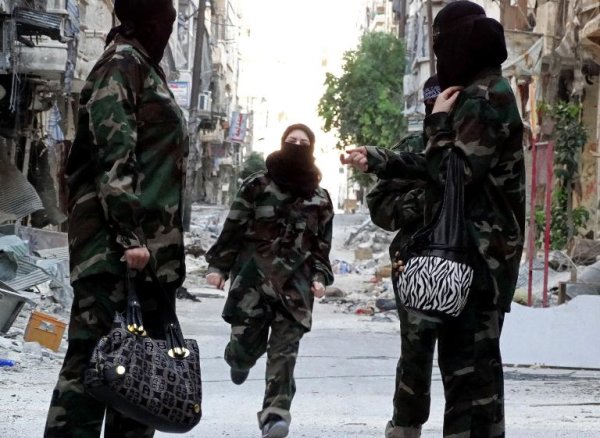Helping Syria
"Joint work with the Syrian authorities has begun on securing the sites where the team will operate, especially in outlying areas."A team from the Organization for the Prohibition of Chemical Weapons is accompanying UN chemical inspectors prepared to embark on their mission to identify, secure and destroy the Syrian Republic's vast stores of chemical weapons. In liquid form and where those chemicals have been weaponized, loaded onto warheads. A time-consuming, expensive, potentially dangerous task, undertaken in an actively violent war zone.
UN Chemical Inspectors
The work is meant to proceed while the brutal civil war unleashed by the Government of Syria against its civil society intending to lethally punish Sunni Syrians for their support of the Free Syrian Army rebels resulted in a vicious chemical attack killing over a thousand. The rebels, now joined by foreign jihadis, with both the regime and the rebels swearing their preparedness to allow the chemical inspectors to proceed without impeding them.
And just as the rebels vehemently denounce the regime for its use of chemical weapons against Syrian citizens and the regime in its predictable turn denies that the use of those weapons of mass destruction were by their hands, and were instead the lethally malicious work of the Islamists, should harm come to the UN chemical inspectors reliant on the guarantees of the belligerents on both sides, each will insist the other to have been responsible.
But the reason for their presence within Syria is to disable the production facilities, although no one yet quite knows just how sizeable the regime's chemical stockpile is, apart from speculation that it represents 1,000-tons of potentially lethal chemicals. The regime has released a list of the sites of its stockpiles, while insisting that some of those sites are under the control of the rebels. If they are inaccessible, there will be no verification possible.
Which will be of tremendous value to the regime which has most likely transferred some of the stockpiles elsewhere, and since it is all a great mystery, no one can claim knowledge of where they might have been deployed. Their presence can remain undetected, and they can present as useful weapons at some future date, to be called upon at the whim of the regime. For their war is likely to be a long one.
As determined as the Alawite Shiite regime is, so too are the Islamist militias that have forced their way onto the rebel stage, to wrest power from the Baathist Shias. While fierce clashes between Syrian troops and al-Qaeda-linked Sunni Muslim fighters are ongoing, the inspectors must learn to navigate their way around the conflicts to reach the identified sites where they plan to commence their operations.
Al-Qaeda-linked Jabhat al-Nusra around Damascas's outer suburbs, and in northern Syria, the Islamic State of Iraq and the Levant are facing off against the regime. For this has become a three-pronged conflict, with infighting among the rebels and the Islamists. And so the theatre of war is forever shifting between towns valuable to the future plans of both the regime and the rebels, as the conflict rises in intensity.
 |
| AFP/Masked female rebel fighters near Aleppo |
The comment by experts at The Hague, that the inspectors' priority remains to reach the first milestone of helping Syria scrap its ability to manufacture chemical weapons by a November 1 deadline is open on the face of the statement, to interpretation as blandly absurd in its content. Helping Syria? to scrap its ability? to manufacture chemical weapons?
Oh, yes indeed. Let the game begin.
Labels: Chemical Weapons, Conflict, Islamists, Syria, United Nations

<< Home